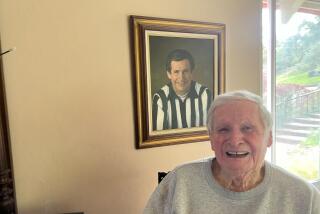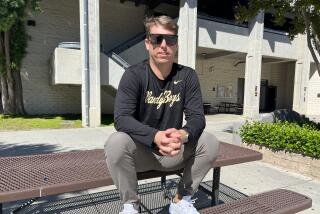COLLEGE BASKETBALL 1990-91 : Sutton’s Place : He Was Out of Coaching Until His Alma Mater Gave Him a Job
- Share via
STILLWATER, Okla. — It was, as standing ovations go, rather modest. For sure, it couldn’t match anything Eddie Sutton experienced while coaching at the University of Kentucky, where the annual Midnight Madness practice that marks the official start of the basketball season draws 10,000 fans.
But as the boots-and-jeans crowd of 2,805 in Oklahoma State’s Gallagher-Iba Arena rose to its feet last Wednesday to salute him before his first game as the school’s coach, an exhibition against Banik Cigel of Czechoslovakia, Sutton felt something special. He felt appreciated again.
Less than two years after losing his job at Kentucky in the midst of one of the most intense investigations ever mounted by the NCAA, Sutton has landed firmly on his feet at Oklahoma State, his alma mater.
He has a team capable of challenging for the Big Eight title, a house on the Stillwater Country Club golf course and a new lease on life.
“I feel just like I did when I went to Arkansas in ‘74,” said Sutton, who built the Razorbacks into a perennial NCAA tournament team before getting the Kentucky job in 1985. “I had (Purdue Coach) Gene Keady and (Lamar Coach) Pat Foster as my assistant coaches, and, boy, we had some fun building that program.
“Then, all of a sudden, we’re in the NCAA tournament every year. I mean, you get in there every year, someday there are going to be some lucky bounces, some calls that go your way--hey, you never know.”
Forced to resign at Kentucky after the 1988-89 season, Sutton, 54, was out of coaching until he was hired last April by Oklahoma State.
Sutton says he had always dreamed of someday returning to Oklahoma State, where he was a player and graduate assistant coach under Henry Iba in the ‘50s. And Oklahoma State supporters, who have had little to cheer about since the Iba era, certainly have always dreamed of having a coach such as Sutton.
But the favorite son has come home with some excess baggage, the heaviest being the circumstances surrounding his departure from Kentucky.
With the Oklahoma State football program in the midst of four years’ probation for recruiting violations, Sutton’s hiring was no sure thing, and school President John Campbell agreed to it only after personally conducting a background check that dragged on so long it hampered Oklahoma State’s basketball recruiting last spring.
“I had donors who expressed both positives and negatives (about Sutton),” Campbell said. “Some major donors expressed very positive things, and some other major donors said, ‘No way.’
“Well, it’s hard not to listen to people who have given you substantial pieces of money and are prospects for other major contributions. It’s also important, when you’re on probation, not to do anything that’s going to exacerbate that situation with the NCAA.”
Sutton resigned at Kentucky two months before the NCAA put the school on three years’ probation with sanctions that included a ban on postseason competition in 1990 and ’91.
Among its findings, the NCAA cited a Kentucky assistant coach, Dwane Casey, for sending $1,000 to a recruit--the now-famous Emery Worldwide air freight shipment to Claud Mills, the father of former Fairfax High School star Chris Mills--and a Kentucky player, Eric Manuel, for cheating on an entrance exam.
Sutton was not named in any of the NCAA’s findings, but his resignation--forced by Kentucky--was cited by the NCAA’s Committee on Infractions as one of the mitigating factors that helped Kentucky avoid a harsher penalty.
After his resignation, Sutton went to work as sort of a roving goodwill ambassador for Nike, traveling the country to attend games involving coaches under contract to the shoe company.
At first, he says, the Kentucky situation had left him so disillusioned that he considered going into business full time. But, as his Nike job pulled him into the 1989-90 season, he found himself thinking of coaching again.
When Oklahoma State’s Leonard Hamilton announced last spring that he was moving to the University of Miami, Sutton saw the opening he had been waiting for.
“The first thing I did was run and call my wife and tell her, ‘Man, let’s throw a victory celebration,’ ” he said.
At Sutton’s request, an Oklahoma State alumnus contacted Myron Roderick, then the school’s athletic director, to pass the word that Sutton was interested in the job. Roderick and Sutton met immediately after the Final Four, and Roderick left the meeting in Sutton’s corner.
But Campbell was not going to apply a rubber stamp.
He spoke to David Berst, the NCAA’s assistant executive director for enforcement, as well as a variety of college administrators who had dealt with Sutton, including Roselle.
He also read portions of “Raw Recruits,” a book on college basketball recruiting published last winter that includes a detailed account of Kentucky’s troubles and reveals that Sutton was treated for alcoholism at the Betty Ford Center in Rancho Mirage in 1987.
After absorbing all this information, Campbell had accumulated enough questions to fill three legal-size sheets of paper, and he put his questions to Sutton at a meeting at Campbell’s home that lasted nearly six hours.
“I went through all those questions one by one, mean as they were--things I’ve never asked people before--because it was so important,” Campbell said. “Eddie answered every single thing to my satisfaction with one exception, and I finally concluded that I wasn’t going to get that one resolved.”
Campbell declined to reveal which question was left unanswered except to say it was not a “compliance” matter.
Seeking to ease the fears of some key Oklahoma State supporters who had raised the drinking question when Sutton’s name had surfaced, Campbell wanted Sutton to go on record about the problem and his treatment of it. Sutton agreed, addressing the matter at the news conference to announce his hiring.
“Now I can’t say that Eddie Sutton will forever remain clean as far as alcohol and substance abuse is concerned,” Campbell said. “I don’t suppose he can (say so), either. But I can tell you, he sincerely thinks he’s clean.”
Said Sutton: “I recognized that there was a problem and that I had to do something about it. Some people get it corrected, some people don’t. I was able to deal with it, and that’s why I know today that I’m much better prepared than I was many years ago.”
Looking back at what transpired at Kentucky, though, Sutton is not as humble.
Of the Mills’ case, he said: “To this day, I’m telling you, I don’t know why Emery, those people out there, would not tell the truth. But where was the money? Nobody ever found the money. The way it was handled . . . I mean, it was crazy.”
Of Manuel, who has been barred from NCAA competition, he said: “It’s criminal what they’re doing to that kid. I told (NCAA Executive Director) Dick Schultz, ‘How can you do this to that kid when you’ve got rapists and other criminals out there playing?’ He said, ‘Well, I don’t handle that.’ ”
Speaking of the case as a whole, Sutton said: “Had the administration stood up (to the NCAA), Kentucky would have walked (away without penalty). There wasn’t anything there. There wasn’t enough there to convict Kentucky. But the university jumped in bed (with the NCAA).”
As for his own role in the school’s problems, Sutton said: “The only thing I learned from the Kentucky situation is maybe I didn’t manage people as well (as he could have). Maybe I had too much trust in people. Maybe they were influenced by outside folks who got to them. I mean, I don’t know.”
At Oklahoma State, he says, he will be more hands on.
“I’m on the staff harder than I’ve ever been,” he said. “I’m not taking anything for granted.”
The Cowboys, who have made two consecutive trips to the National Invitation Tournament, have four returning starters, among them all-Big Eight center Byron Houston; and Sutton’s son, Sean, the point guard on his last Kentucky team.
Sean Sutton, who did not play basketball last season, considered enrolling at Georgia Tech or Florida State, but elected to play at Oklahoma State because, as he put it, he wanted “to help my dad get back among the national elite of coaches, as he once was.”
Whether that happens remains to be seen. But, for the time being, Stillwater has given Sutton refuge.
“I’ve been here seven months,” he said. “And it has really been a honeymoon.”
More to Read
Go beyond the scoreboard
Get the latest on L.A.'s teams in the daily Sports Report newsletter.
You may occasionally receive promotional content from the Los Angeles Times.










